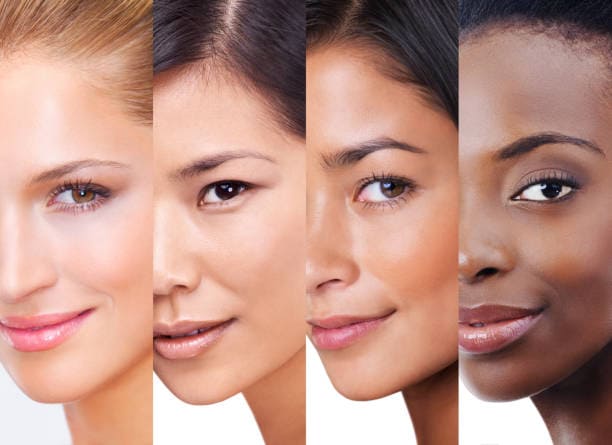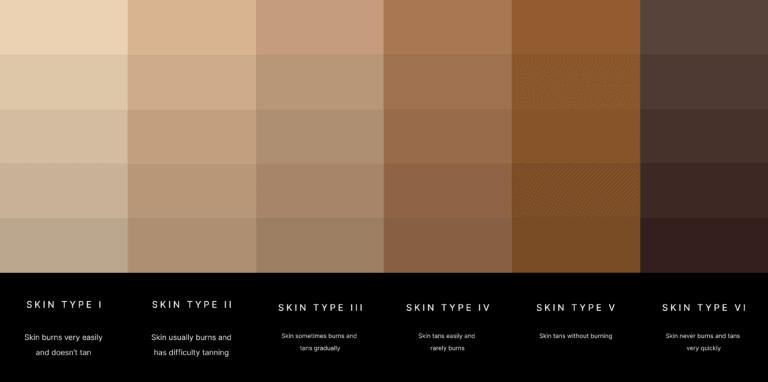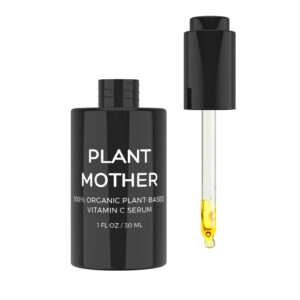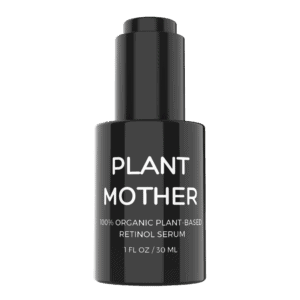Everything You Need To Know About Fitzpatrick Skin Type

Have you heard of Fitzpatrick skin type? We know skin can be dry, oily, combination, etc. but did you know that there’s another way to categorize skin? In this article, we’ll guide you through all skin types and what’s best skincare routine for each.
What is the Fitzpatrick skin TYPE CHART?
The Fitzpatrick skin chart is a scale used to categorize skin by how photosensitive it is. That is to say, how skin reacts to the sun. It’s used to evaluate individuals’ skin needs and make recommendations regarding sun care. There are six types of skin according to the Fitzpatrick scale and each type encompasses a range of skin tones that have similar reactions to prolonged sun exposure. We know that lighter skin tends to burn more quickly than darker skin, but the Fitzpatrick scale provides more specific analysis of fair, light, medium, dark, and deep skin tones respectively.
It’s important to note that even the deepest skin needs protection from the sun and it’s crucial for everyone to wear sunscreen. While darker skin won’t burn as quickly as pale skin, it is still possible to get a sunburn with dark skin and repeated sunburns raise the risk of developing certain skin cancers. Everyone is susceptible to sunburn no matter their color, and it’s critical for everyone to protect themselves and their skin. When choosing the right sunscreen, always look for natural ingredients.

Fitzpatrick Skin Type I
Those with Fitzpatrick skin type I are very pale and typically have light blonde or red hair and blue or green eyes. This skin type never tans, but burns quickly. It may also freckle. In order to keep type I skin healthy, it’s recommended that you spend as much time in the shade as possible. If that’s not possible, consider wearing a thin, breathable shirt with long sleeves when doing prolonged activity in the sun.
Skin Type II
Individuals with this type of skin tend to burn easily and tan poorly. The key difference between types I and II is that type II skin can tan, though poorly. Those with Fitzpatrick skin type II can have any combination of hair and eye color, but they tend to have blonde, red, or brown hair and light eyes. This type of skin is also prone to developing freckles, though not as extensively as type I. As with type I, it’s important for those with type II skin to wear garments that cover the skin in order to best protect it when shade is not available.
Fitzpatrick Skin Type III
This type of skin tends to tan lightly and sun burns will often fade to a tan. Individuals with this skin type tend to have dark-blonde or brown hair with light brown or hazel eyes. This type of skin has more melanin than types I and II which is why it tans as opposed to burning. It can freckle occasionally, but tends not to for the most part.

Fitzpatrick Type IV
Type IV skin tends to be olive or light brown before sun exposure and individuals with this skin type tend to have brown hair and brown eyes. This type of skin rarely freckles, doesn’t burn often, and tans frequently.
Skin Type V
This type of skin is brown and rarely burns but tans easily. Those with this type of skin tend to have dark brown or black eyes and dark brown or black hair. Despite the tendency not to burn, it is still crucial that individuals with this type of skin wear sunscreen as sunscreen helps decrease the risk of developing skin cancer due to UV exposure.
Type VI
Individuals with type VI skin tend to have black hair and black eyes. Type VI skin almost never burns and tans very easily. As with type V, it’s still important for those with type VI skin to wear biodegradable sunscreen even though they likely won’t experience sunburn.
Best SKINCARE For All Skin Types
Facial serums offer exceptional benefits for all skin types, recognized as among the most effective skincare solutions. Packed with nourishing nutrients, serums address various skin concerns with targeted formulas.
Plant Mother’s Retinol and Vitamin C serums stand out for their blend of over 20 organic vegan ingredients, formulated as oil-based solutions. Crafted from unrefined organic botanical oils, these natural serums not only deliver active ingredients but also enhance natural collagen production, promoting healthy and nourished skin.
Plant Mother’s Vitamin C serum features plant-based vitamin E and plant-based niacinamide, addressing dryness and balancing natural oil production. Unlike water-based alternatives, Plant Mother’s Vitamin C boasts an oil-rich formula, abundant in active natural Vitamin C, E, and quercetin (plant-based). This powerful blend combats free radicals, reduces UVA/UVB damage, and stimulates collagen production.
Vegan retinol, like Plant Mother’s Retinol serum, harnesses natural provitamin A from fresh botanicals such as Sea Buckthorn Berry, Rosehips, Hibiscus, and Carrot seeds. Unlike lab-produced or synthetic alternatives, it does not increase skin sensitivity to sunlight, minimizing the risk of redness and peeling often associated with synthetic Retinol products.
Switch To Organic Skincare
When searching for skincare products that match both your skin type and values, thorough research is essential. Whether you’re seeking zero waste options or brands using natural ingredients, it’s crucial to vet each choice carefully.
Furthermore, prioritizing non-toxic and clean skincare is vital when selecting products aligned with your needs and values. Organic skincare stands out as a healthier alternative to conventional options, as it’s crafted without harmful chemicals or synthetic additives. This results in products rich in nutrients and better suited for your skin’s well-being and your ethical preferences.
Final Thoughts
The Fitzpatrick skin type and scale measures the skin’s reaction to UV exposure, which tends to be related to the amount of melanin in the skin. No matter where your skin falls on the scale, it’s important to protect yourself from certain types of skin cancer by wearing sunscreen and seeking shade whenever possible. Always look for biodegradable sunscreen because it is better for you and the planet.
MEDICAL DISCLAIMER
This content is for informational and educational purposes only. It is not intended to provide medical advice or to take the place of such advice or treatment from a personal physician. All readers of this content are advised to consult their doctors or qualified health professionals regarding specific health questions. The publisher of this content does not take responsibility for possible health consequences of any person or persons reading or following the information in this educational content. All viewers of this content, especially those taking prescription or over-the-counter medications, should consult their physicians before beginning any nutrition, supplement, skincare product, or lifestyle program.



